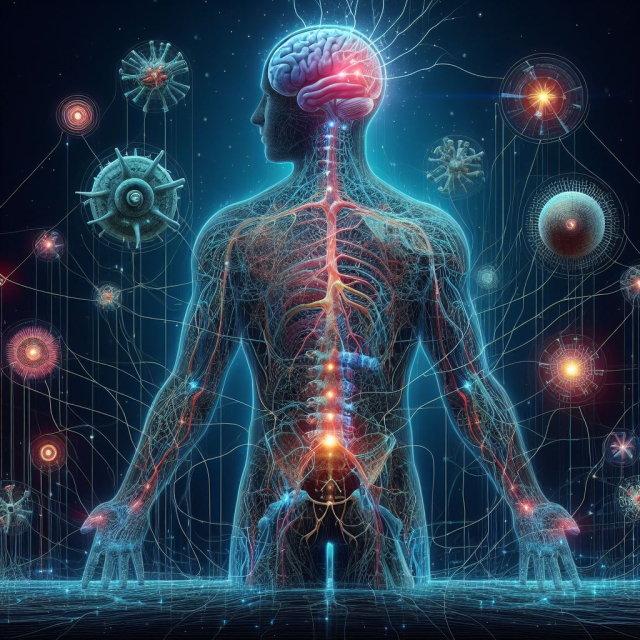The nervous system is a complex and sophisticated network of cells and tissues that coordinate the functions of the body and allow communication between its various parts. It ranges from sensory perception to the execution of movements and the regulation of internal functions. This article will explore the anatomy and functions of the nervous system, its development and maintenance, as well as the most common diseases and disorders that affect it.
Anatomy of the Nervous System.
The nervous system is divided into two main components: the central nervous system (CNS) and the peripheral nervous system (PNS).
Central Nervous System (CNS).
The CNS is the body's control center and includes the brain and spinal cord.
- Brain: It is the most complex organ in the human body, responsible for functions such as thinking, memory, emotion and coordination of movements. It is divided into several parts, including:
- Cerebral Cortex: The outer layer of the brain, responsible for higher cognitive functions.
- Cerebellum: Located at the back of the brain, it coordinates movement and balance.
- Brainstem: Connects the brain to the spinal cord and regulates automatic functions such as breathing and heart rate.
- Spinal Cord: A long, thin cylinder that extends from the brain stem to the lower back. It transmits information between the brain and the rest of the body and controls automatic reflexes.
Peripheral Nervous System (PNS).
The PNS connects the CNS to the rest of the body and is divided into two parts:
- Somatic Nervous System: Controls voluntary activities and collects sensory information from the external environment. It includes the nerves that connect to the skin, muscles, and joints.
- Autonomous Nervous System: Regulates involuntary functions of the body, such as digestion, heart rate and breathing. It is subdivided into:
- Sympathetic System: Prepares the body for stress or emergency situations (fight or flight response).
- Parasympathetic System: Promotes rest and digestion functions, maintaining calm and energy conservation.
Functions of the Nervous System.
The nervous system performs a variety of functions crucial to daily life.
Communication and Coordination.
The nervous system allows communication between different parts of the body and coordinates their activities. Neurons, the main cells of the nervous system, transmit electrical and chemical signals along their lengths to communicate information.
Sensory Perception and Response.
Sensory nerves collect information from the environment and transmit it to the CNS, where it is interpreted and an appropriate response is generated. This includes the perception of stimuli such as light, sound, heat, and pain.
Regulation of Body Functions.
The autonomic nervous system regulates many involuntary bodily functions essential for life, such as breathing, heart rate, blood pressure, and digestion.
Cognitive Functions.
The brain is responsible for higher cognitive functions such as thinking, memory, language, and decision making. These functions are crucial for social interaction, learning, and problem solving.
Development and Maintenance of the Nervous System.
The development and maintenance of the nervous system are complex and continuous processes.
Prenatal and Postnatal Development.
The development of the nervous system begins early in the embryo with the formation of the neural tube, which becomes the brain and spinal cord. During prenatal and postnatal development, neurons multiply, migrate to their final destinations, and form synaptic connections.
Neuroplasticity.
Neuroplasticity is the ability of the nervous system to reorganize and adapt in response to experience and learning. This includes the formation of new synapses and the remodeling of existing ones.
Maintenance and Health of the Nervous System.
The health of the nervous system depends on several factors:
- Nutrition: A balanced diet, rich in vitamins and minerals, is essential for neuronal functioning. Nutrients like omega-3 fatty acids are crucial for brain health.
- Exercise: Regular physical activity improves blood circulation to the brain and promotes neurogenesis (formation of new neurons).
- Sleep: Adequate sleep is crucial for memory consolidation and the removal of toxins from the brain.
- Mental Stimulation: Continuous learning and mental activity maintain neuronal plasticity and prevent cognitive decline.
Diseases and Disorders of the Nervous System.
The nervous system can be affected by various diseases and disorders, which can have a significant impact on quality of life.
Neurodegenerative diseases.
- Alzheimer's: A progressive disease that causes degeneration of brain cells, leading to memory loss and cognitive decline.
- Parkinson's: Characterized by the loss of nerve cells in a part of the brain called the substantia nigra, causing tremors, stiffness, and movement problems.
Neuromuscular disorders.
- Amyotrophic Lateral Sclerosis (ALS): A disease that affects motor neurons, leading to progressive muscle weakness and paralysis.
- Myasthenia Gravis: An autoimmune disorder that causes muscle weakness due to problems in communication between nerves and muscles.
Disorders of the Autonomous Nervous System.
- Dysautonomia: A group of disorders that affect the body's automatic functions, such as blood pressure, heart rate, and digestion.
Infectious diseases.
- Meningitis: Inflammation of the membranes surrounding the brain and spinal cord, usually caused by a bacterial or viral infection.
- Encephalitis: Inflammation of the brain, often due to viral infections.
Psychiatric Disorders.
- Depression: A mood disorder that negatively affects the way a person feels, thinks, and handles daily activities.
- Schizophrenia: A serious mental disorder that affects a person's ability to think, feel, and behave clearly.
The nervous system is essential for all functions of the human body, from the most basic to the most complex. Its anatomy and functions reflect the intricate network of communication and control that sustains life. Maintaining your health is crucial to quality of life, and understanding your diseases and disorders is critical to developing effective treatments and therapies. With continued advances in neuroscience research, we are getting closer to fully understanding this vital system and improving our ability to care for it.






